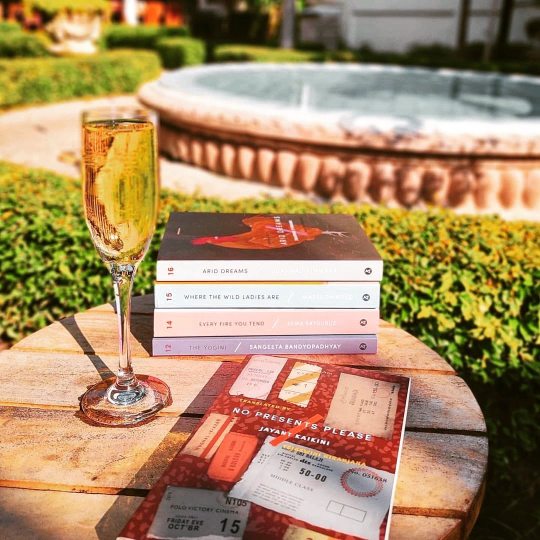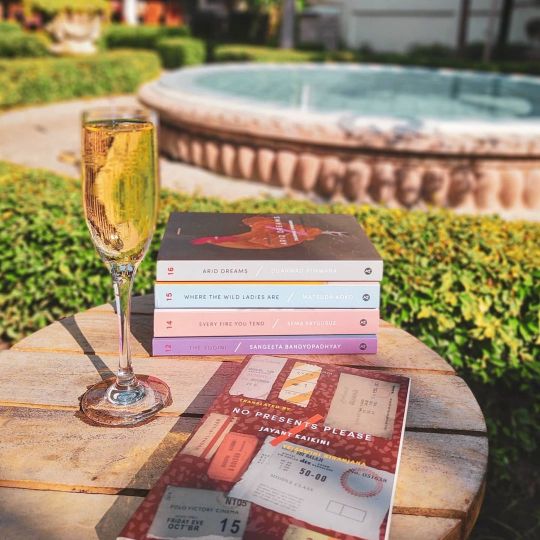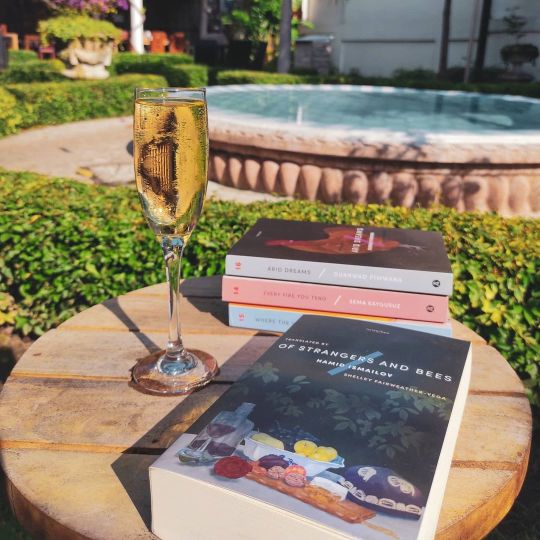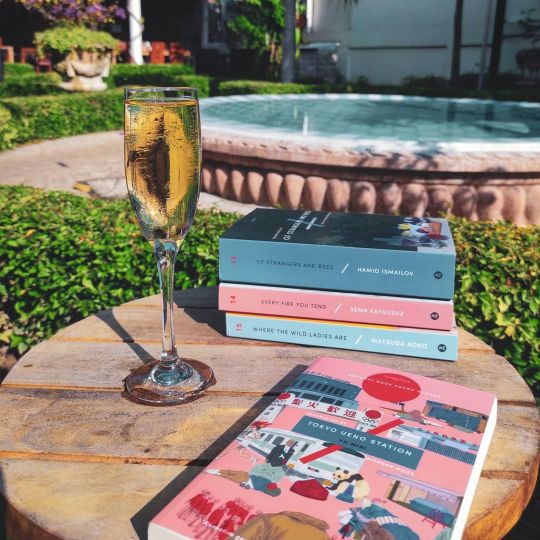#readtiltedaxis
Explore tagged Tumblr posts
Photo

Sixteen short stories are written by Jayant Kaikini and are wrapped in No Presents Please. Those short stories are connected with one red line: Mumbay life. The essence of Mumbai is vividly seen here with the local trains, the traffic, the crowd, the street vendors and the people. Yet it's more than that. It also rises the issues that the people in that city (or maybe in our society too) are facing: the arranged marriage like in City Without Mirrors; the unequal relationship not only between male and female through loveless marriage but also the unequal relationship among human through social gaps and caste like in No Presents Please (which happens to be one of my fave stories). Another interesting aspect in this novel is the choice of female characters. Most of them are either prostitute or domestic workers. This leaves me questioning like, 'are those what Kaikini tries to address?' Reminds me a bit of Manto's Bombay Stories in which he likely portrays the local life through the eyes of sex workers. It's interesting to know that Kaikini tries to give women a certain voice and role in his book like a 39-virgin woman who runs away after the matchmaking or Mogri's World (another story I love). My note here is that I feel like Kaikini needs to give more spaces to those female characters to develop themselves. I honestly think that voicing women as a male author is a good idea yet Kaikini often cooptates himself in portraying women (or commodifying women) like in the City Without Mirrors with the virginity certificate and some other stories. Thus giving these female character to develop their plot will do good tho. Anyway, I enjoy reading this book because in terms of character and plot, the issues are relatable and it portrays the common people living a common life. It's like you're watching a movie about Mumbai and you see the life they're living (it's a bit over-generalisation tho) and the diversity. BOOK 17: NO PRESENTS PLEASE by JAYANT KAINIKI for my #ReadTiltedAxis Month Translated by: Tejaswini 📍 India Des ✨ (at Krungthep Mahanakorn) https://www.instagram.com/p/CeFKFDzPxAY/?igshid=NGJjMDIxMWI=
0 notes
Photo

The 14th book in my #ReadTiltedAxis is Every Fire You Tend written by Sema Kaygusuz. It's not an easy read for me even I do love the part when Sema rises the issues about motherhood tho. People are often afraid to live alone so they have children thinking that they may have somebody to loook after them when they're older. They forget that the children will always be their responsabilities until they die and not the vice versa - at least this is what I always think. It starts with Bese's experience in the aftermath of the massacre when she has her encounter with Hizir. The protagonist of the novel is an unnamed woman in Istanbul. The plot of the story later goes back and forth through history mixed with myths and Koranic narrative of Moses' odd encounter with Hizir (see Al-Kafh surah of the Koran), the parting of Elisha from Elijah (both seemed to be the manifestations of Hizir), the story about the legendary Zelqarnayn with Prophet Abraham and Isaac. The stories told are non-linear and it may be confusing for us. Yet it's interesting to see how the author integrates her granny's stories of the Dersim massacres back in 1937-38 with her experience and turn it into a story. Some of the allegories used in the novel like the fig trees may not help others to understand the whole plot in a glimpse. I've had to reread the novel twice to fully grab the essence of the stories. My tip is to take a note while reading because with the numbers of characters, places, and setting of time you may get lost as a reader. Thus for somebody like me, taking notes is really helpful. Do not miss the author and translator's notes too! Their explanation regarding the history and the translation is enlightening. A bit info: 👉 Hizir is neither saint, prophet, angel nor dervish, yet he is all of these at once in the Islamic theology.He's the one who keeps reminding Moses to be patient and tests Moses's patience by doing an unexpected things like killing a young boy. 👉 Slide 2-5 are a glimpse of Dersim massacre/rebellion (Dersim İsyanı in Turkish) BOOK 14: EVERY FIRE YOU TEND by SEMA KAYGUSUZ Translated by: Nicholas Glastonbury 📍 Turkey Des ✨ (at Krungthep Mahanakorn) https://www.instagram.com/p/CeEgAYePfxt/?igshid=NGJjMDIxMWI=
0 notes
Photo

'Sergius Seeks Bacchus', is a collection of 33 poems and was translated by Tiffany Tsao from Norman Erikson Pasaribu's 'Sergius Mencari Bacchus: 33 Puisi'. The title is intriguing as it refers to the 4th Century Roman soldiers and martyrs who increasingly are adopted as an emblem by the LGBTIQ Christian community. It's hard for me to pick which poems I love the most. Each of the poem is unique and it speaks in its own way. I do love the way Norman twists one of my favourite poets Dante Alighieri's the Divine Comedy and La Vita Nova into his own (Dante's La Vita Nuova is one of my favourite anyway). Norman is also brilliant in playing with words giving some astonishment and colours to those 'sound-like-sad-and-lonely' poems like Are You Still There at the Station and Finding Leo (have you found your Leo, Norman? May you find your Leo whoever and wherever he is, Norman @keletropist ). In particular Norman's Sergius Seeks Bacchus does not only rise the Indonesian issues about religious and ethnic minority but also the controversial and never-ending debate about the Indonesian sexuality. What I also love the most is the fact that this book comes with a moving translator's afterword. Tiffany Tsao @tiffanytsao explains how she worked closely with Norman while translating these poems. Several issues like using the 3rd person pronouns when it comes to translating the gender neutral in Bahasa Indonesia are also mentioned in this section. A great combo tho! Thank you, @namakurhea for shipping me this book. BOOK 11: SERGIUS SEEKS BACCHUS by NORMAN ERIKSON PASARIBU for my #ReadTiltedAxis Month Translated by: Tiffany Tsao 📍 Indonesia Des ✨ #bookishindonesia #bookaholic #bookstagram #bookstagramindonesia #bibliophile #bookreview #bookreviewer #booknerd #bookaddict #bookblogger #bookaesthetic #bookenthusiast #booksbooksbooks #descalibrary #descaslibrary #descareading2022 #fictionbook #literaturejunkie #nonfiction #igreads #igbook #instaread #instabooks #ReadTheWorld22 #riotgrams #BookstagramReels #TiffanyTsao #NormanEriksonPasaribu #SergiusSeeksBacchus (at Bangkok Thailand) https://www.instagram.com/p/CeCbECtv6I2/?igshid=NGJjMDIxMWI=
#readtiltedaxis#bookishindonesia#bookaholic#bookstagram#bookstagramindonesia#bibliophile#bookreview#bookreviewer#booknerd#bookaddict#bookblogger#bookaesthetic#bookenthusiast#booksbooksbooks#descalibrary#descaslibrary#descareading2022#fictionbook#literaturejunkie#nonfiction#igreads#igbook#instaread#instabooks#readtheworld22#riotgrams#bookstagramreels#tiffanytsao#normaneriksonpasaribu#sergiusseeksbacchus
0 notes
Photo

I'll Go On, tells the story of two sisters Nana and Sora and their friend Naghi Oraboni. Both Nana and Sora (and their mother, Aeja) moved into a shared apartment with Naghi and his mother, Sunja (whom they refer later to as Sunja Ajumoni). Nana, Sora and Naghi has a similar life: three of them lost their father when they're still young. Nana and Sora's father died in an industrial accident when they were so young. Meanwhile, Naghi's father also died, of a sudden stroke while working. The story continues with Sora and her dream. She has a conception dream but she has no sex for a year. So, she suspects that the dreams relates to her sister Nana. And Nana indeed turns out to be pregnant with her co-worker Moseh. The narrative of this novel is told in three sections. Sora, Nana and Naghi narrate their own stories in turn. Their stories later reveal the kinship between the sisters, their relationship with Naghi. Sora and Nana also reach an agreement related Nana's pregnancy. One thing should be highlited: all of their stories are basically an echo of their childhood experiences and things they have been through when growing up which later influence their lives as adults. I found out that the book is mediocore. I found it disappointing in terms of plot, too many "convo" among the characters that overlaps each other and the lack of depth in those stories leave some aspects of the theme the author wants to rise unexplored. I don't know whether it's because of the translation - like the essence of those sentences is MIA during the translation or simply just the story. Yet I always admire Tilted Axis for being so generous in enriching the world literature. Terima kasih, Tilted Axis! 🙏 PS: the book was a gift from my wonderful darling @namakurhea. ❤ BOOK 9: I'LL GO ON by HWANG JUNGEUN for my #ReadTiltedAxis Month Translated by: Emily Yae Won 📍 South Korea Des ✨ (at Bangkok Thailand) https://www.instagram.com/p/CeAxvWxLlOY/?igshid=NGJjMDIxMWI=
0 notes
Photo

Moving Parts: Which part is moving? Moving Parts is the second collection of short stories written by Prabda Yoon, a Thai writer and translated by Mui Poopoksakul after the Sad Part Was - which I do love. There are 11 short stories spread through 160 pages narrate the urban life set in Thailand. They portray the social life such as prostitution and divorce. Some stories sometimes are left open to interpretation. They all centre on a particular part of the body too. My favourite short story entitled New Hand for example. It tells a story about a boy who tries to gather his courage to ask a girl if he can hold her hand. Nay, it doesn't really mean holding hand literally. In this story, it involves the girl's intention to the boy for him to look after overnight. I also love another story entitled Destiny's Dick. Telling a penis-less man who keep visiting the brothel just because he wants to be acknowledged as a real man. Even the escort ladies in that brothel keep spreading the rumours about his penis. It goes on like that until a young escort comes and confront him - leaving him - as a man and an adult crying. I personally think that most short stories in Moving Parts do have an interesting idea despite the matters they want to rise: buttplugs, porn movies, the penis-less man as aforementioned, and some more. Yet I do not know why I still pick the Sad Part Was instead of Moving Part. I guess it's because I can relate myself to the storiea in The Sad Part Was while in this novel, some are just okay yet not so provocative. BOOK 8: MOVING PARTS BY PRABDA YOON for my #ReadTiltedAxis Month Translated by: Moi Poopoksakul 📍 Thailand PS: leaving you a video of a part of the-recent-Patpong;an old red district and one of the famous ones in Bangkok where Lung and I visited Patpong while ago - it was so empty as there's not so many tourists around. Des ✨ (at Bangkok Thailand) https://www.instagram.com/p/CeAFyN5vchs/?igshid=NGJjMDIxMWI=
0 notes
Photo

Been in a slow book review mode these days. I read a lot but I am just freaking lazy these days to post my review in IG or my blog. Blame the "busy" love life, professional matters and the holiday vibes! Anyway, been reading Tilted Axis books also so far. And one of them is this book. It follows the life of the Uzbek writer, Abdulla Qodiriy who is thrown to jail at the start of the novel. During his imprisonment, he reconstructs the book he was trying to finish writing and it’s about queen Oyhon. It’s not easy following the pros, the cons, and the political supremacy during Stalin’s regime. Abdulla will have to deal with his mental state also to finish writing the book. Abdulla is like the Uzbek version of Pramoedya Ananta Toer. The Devil Dance by Hamid Ismailov is not an easy reading. It takes an extra effort just to finish it. It seems to be a novel of two disconnected stories. Yet once you read it, you will realise that both stories are connected, intersected and intertwined. There are fictional yet real characters in the novel. The most intriguing one is the figure of Oyxon, an Uzbek poet queen who was married to three khans. You will see many cultural and historical sections in this novel. What I love the most is the parts where Ismailov serve the poems into our plate as a reader. Those poems remind me of the lines in Song of Salomon. So sensual, so sexy, so erotic yet aren’t trashy! Another good point of the novel is the translation. Rayfield has made put a great effort also in translating Ismailov. He really turned it into something which is not only beautiful but also digestible for us to read. The book was a gift from my wonderful Ibu Ann. BOOK 7: THE DEVIL’S DANCE BY HAMID ISMAILOV for my #ReadTiltedAxis Month Translated by: Donald Rayfield 📍Uzbekistan Des ✨ (at Krungthep Mahanakorn) https://www.instagram.com/p/Cd-LJ7QrxC_/?igshid=NGJjMDIxMWI=
0 notes
Photo

Meet Mia, 12 yo girl who is living a mervelous life. Everyone including his two "Fathers" and mum alwaya try to please her. She can have everything she wants in a glance just by clicking her fingers. She is lucky and she is a star in everyone's eyes. Then meet the Child, her schoolmate. She lives an opposite life. None knows her name, even the Child doesn't know her name even she's obsessed with words and the fountain pen. She comes to her liking in killing after experiencing domestic abuse at home. Both Mia's and the Child's is intersected in the first part of the story some time in 1998 which later ends tragically. Years later in 2013,meet the narrator: a literature teacher and a writer tries to talk to her creation, to the Child, to herself and to her readers. She brings them through the shifting of the recent time and the reminiscence of the past. Then why is it about? The Impossible Fairytale to me talks in a way that things are not always as beautiful as the fairytale. It's about an isolated, ignored, repressed, forgotten child who would have to undergo cruelty and violence in life. It's about growing up with the scars ome brings from the unpleasant childhood. It's about live the dark life and tell the darkest secret. The Impossible Fairytale may not be an easy read, but it's a perfect book to complete. The book is available to purchase for an affordble price at @periplusid and @periplus_malioboro BOOK 5: THE IMPOSSIBLE FAIRYTALE BY HAN YUJOO for my #ReadTiltedAxis Translated by: Janet Hong 📍 South Korea Des ✨ #bookishindonesia #bookaholic #bookstagram #bookstagramindonesia #bibliophile #bookreview #bookreviewer #booknerd #bookaddict #bookblogger #bookaesthetic #bookenthusiast #booksbooksbooks #descalibrary #descaslibrary #descareading2022 #fictionbook #literaturejunkie #nonfiction #igreads #igbook #instaread #instabooks #ReadTheWorld22 #riotgrams #BookstagramReels #TheImpossibleFairytale #HanYujoo #KoreanLiterature (at Bangkok Thailand) https://www.instagram.com/p/Cd3ZUEvP8Po/?igshid=NGJjMDIxMWI=
#readtiltedaxis#bookishindonesia#bookaholic#bookstagram#bookstagramindonesia#bibliophile#bookreview#bookreviewer#booknerd#bookaddict#bookblogger#bookaesthetic#bookenthusiast#booksbooksbooks#descalibrary#descaslibrary#descareading2022#fictionbook#literaturejunkie#nonfiction#igreads#igbook#instaread#instabooks#readtheworld22#riotgrams#bookstagramreels#theimpossiblefairytale#hanyujoo#koreanliterature
0 notes
Photo

On 20 January 2019, the rooftop of the Namildang Building in Seoul district of Yongsan was engulfed in flames. Five protesters who climbed the watchtower because they didn't want to be driven from their himes became a blacken corpes. 355 days after the incident, their body were taken out of the storage. Namildang Building was demolished due to the development programme and the legal battle came to an end after the supreme court rejected the evidences. Yet the real truth has never been truly and fully revealed. The incident has inspired Hwang Jungeun to write One Hundred Shadows. It starts with Eungjo and Mujae, two youngsters who fall in love after working together as apprentices at the slum electronics market. The market runs the risks of being shut down and when it's scheduled for being demolished, the shadows of the inhabitants starts to appear mysteriously. The story to me is dark, set of fantasy-fiction at first but it actually goes beyond that. The social issues like the gap of socio classes, the human nature and the critics towards the govt. policies are clearly seen here. The shadows to me are just an allegories. They may represent those wandering spirit like the victims in Yongsam incident. They also may represent us that are basically like a shadow wandering aroung like a living creature or living zombie looking and going through uncertainty in life. Apart of the fact that this book is open for many interpretations, I enjoy reading the book. Ah, a book worth reading. Mind you that my darling Danja @danchireads is hosting reading run on Korean Literature every March in #MarchinKorea . Meanwhile all the books I read published by Tilted Axis Press can be found in my highlight #ReadTiltedAxis . One Hundred Shadows by Hwang Jungeun along with other books published by Tilted Axis are available to purchase at @post_santa for an affordable price. BOOK 2: ONE HUNDRED SHADOWS BY HWANG JUNGEUN Translated by: Jung Yewon 📍 South Korea (at Krungthep Mahanakorn) https://www.instagram.com/p/CduCziivnt7/?igshid=NGJjMDIxMWI=
0 notes
Photo

What is the most important part of being a parent? To see the children happy and are able to pursue their dreams. That's why most parents work hard for providing the best for the children. Yet in a village in Tamil Nadu, things work differently. Three generation of women will have to suffer after their life is affected by some patriarchal values and decisions. Things get worse because the religious values and the local norms are intersected and perpetuate those patriarchal and masculine dominations in that society. Women are unable to raise their voice nor even to stand for themselves. Everyone is a moral guardian to another. I do not want to go on with the plot as I may end up giving you the spoilers. Overall when we are about having the Buddy Read on this book on 2 May 2021. But the female characters and the masculine domination (or stupidity) which operate throughout the novel leaving me breathless. It's prolly because those are something that we see or maybe we experience in our everyday life. And this is what makes us horrified. Yet that's what Salma prolly wants us to see: the subjugation of women as a second class citizen. I firstly had a problem with the numbers of the characters here. I would even have to take a note and draw a biological tree to keep myself in track. But this book really leaves me emotionally attached. My heart constricts seeing how the society and religious actors treat those women. It breaks my heart seeing the sacrifiction those woman have to make throughout Salma's Women Dreaming too. Ah, Salma's provocative yet evocative writing and Meena Kandasamy's beautiful translation making it easy for us to be so deeply immersed with the story. The Buddy Read will host a book discussion on Salma's Women Dreaming on 2 May 2021. DM Rhea @namakurhea to book your slot. You can grab your copy at Transit Santa @transitsanta for an affordable price too. BOOK 18: WOMEN DREAMING by SALMA for my #ReadTiltedAxis Month Translated by: Meena Kandasamy 📍 India Published by @tiltedaxisbooks/ @tiltedaxispress (at Desca's Library) https://www.instagram.com/p/CN4cfrvrpyX/?igshid=1xy83f6wowm3y
0 notes
Photo

Sixteen short stories are written by Jayant Kaikini and are wrapped in No Presents Please. Those short stories are connected with one red line: Mumbay life. The essence of Mumbai is vividly seen here with the local trains, the traffic, the crowd, the street vendors and the people. Yet it's more than that. It also rises the issues that the people in that city (or maybe in our society too) are facing: the arranged marriage like in City Without Mirrors; the unequal relationship not only between male and female through loveless marriage but also the unequal relationship among human through social gaps and caste like in No Presents Please (which happens to be one of my fave stories). Another interesting aspect in this novel is the choice of female characters. Most of them are either prostitute or domestic workers. This leaves me questioning like, 'are those what Kaikini tries to address?' It's interesting to know that Kaikini tries to give women a certain voice and role in his book like a 39-virgin woman who runs away after the matchmaking or Mogri's World (another story I love). My note here is that I feel like Kaikini needs to give more spaces to those female characters to develop themselves. I honestly think that voicing women as a male author is a good idea yet Kaikini often cooptates himself in portraying women (or commodifying women) like in the City Withour Mirrors with the virginity certificate and some other stories. Thus giving these female character to develop their plot will do good tho. Anyway, I enjoy reading this book because in terms of character and plot, the issues are relatable and it portrays the common people living a common life. It's like you're watching a movie about Mumbai and you see the life they're living (it's a bit over-generalisation tho) and the diversity. Grab your copy at @transitsanta or Tilted Axis's website. It's a good reading tho... BOOK 17: NO PRESENTS PLEASE by JAYANT KAINIKI for my #ReadTiltedAxis Month Translated by: Tejaswini Niranjana 📍 India Published by @tiltedaxisbooks/ @tiltedaxispress (at Desca's Library) https://www.instagram.com/p/CN14VqXLMAH/?igshid=1bdg47nvw1lph
0 notes
Photo

I have been falling in love with Hamid Ismailov's recently. I know that to understand Ismailov's is like to go through male's head - difficult and an impossible task to do - who can understand men's way of thinking anyway. This novel is without exception. In this novel Of Stranger and bees, you will read several stories in one whole scenario. You will encounter Sheikhov, an Uzbek novelist who wander around various cities and hunts for traces of Avicenna. He is convinced that Avicenna did not die in 1037 but he's still very much alive for several centuries. There are also various scemes in the life of presumable not-dead Avicenna whom Ismailov refers as The Stranger in this novel and a story of a bee called Sina. These characters pop up in various time and places. What is always interesting in Ismailov's works is the mixture between reality and fiction is so thin. There is also rich portrayal in the local culture and wisdom along with the beliefs. In this novel? The Sufi wisdom for instance. The bees taken as the title of the novel is prolly inspired by one of the verses in the Holy Koran: An Nahl; named after honey bees mentioned in verse 68, and contains a comparison of the industry and adaptability of honey bees to the industry of man. Ismailov linked it briliantly to Avicenna/Ibn Sina, a Persian polymath who is regarded as one of the most significant physicians, astronomers, thinkers and writers of the Islamic golden age and the father of early modern medicine. There are many characters, some plots which form stories with different setting of place and time. They do not really link together and one may get lost reading this novel. Yet it is not a-mission-impossible- thing tho because the writing style (it's freaking long) has very light tone and it invites you to go on reading. The translator's note is also insightful esp. about the Sufism and Persian lit. Give it a read! Thank you, Mas T.A for shipping the book all the way from KL and @kinokuniyamalaysia for the book suply. BOOK 13: OF STRANGERS AND BEES by HAMID ISMAILOV for my #ReadTiltedAxis Month Translated by: Shelley Fairweather-Vega 📍 Uzbekistan Published by @tiltedaxisbooks/ @tiltedaxispre (at Desca's Library) https://www.instagram.com/p/CNpIEWWrn-n/?igshid=1788neezumbmk
0 notes
Photo

Homi, a woman from a middle-class family and a television journalist is married to Lalit, a banker. They do have a happy marriage, never lack of money and sex is always great. So why does Homi feel like something is missing and she is in need for looking for that missing piece? Things have changed after Homi is stalked by a hermit on the road. She then becomes obsessed with fate and destiny leading her into somebody with different personalities. Her 'new' behaviour causes her relationship with Lalit crumbling. She later keeps searching for the answers she is looking for: certain aspects of her life and how much her fate controls her. Her search lands her in Benaras later. Yet The Yogini is more than that. It is written from Homi's perspectives herself: woman from dysfunctional families who sees things differently from common people. She explores the dynamics of a relationship, class differences and the gender stereotype in the society that favours men. I always love the way Sangeeta portrays her heroine. They are always portrayed as a free-spirited woman who is sexually liberated even when they're exploring their female sexuality or undergo an erotic escapades. Sangeeta's wmen are portrayed as a human with their lust, their desire, their loneliness and the urge to love and to be loved. Those women do not only become a mirror but also challenge the system in our society that laments women who seeks their (also sexual) freedom. The Yogini to me comes as unconventional read and will make you question. It makes me questioning the meaning of womanhood and freedom. Yet it is very entertaining because the language used is so crunchy and easy, making this book digestable in one bite. BOOK 12: THE YOGINI by SANGEETA BANDYOPHDYAY @sangeeta_sankhini for my #ReadTiltedAxis Month Translated by: Arunava Sinha @arunavasinha 📍 India Published by @tiltedaxisbooks/ @tiltedaxispress (at Desca's Library) https://www.instagram.com/p/CNmOg1ZraoV/?igshid=1xxnbvgo85wj4
0 notes
Photo

'Sergius Seeks Bacchus', is a collection of 33 poems and was translated by Tiffany Tsao from Norman Erikson Pasaribu's 'Sergius Mencari Bacchus: 33 Puisi'.The title is intriguing as it refers to the 4th Century Roman soldiers and martyrs who increasingly are adopted as an emblem by the LGBTIQ Christian community. It's hard for me to pick which poems I love the most. Each of the poem is unique and it speaks in its own way. I do love the way Norman twists one of my favourite poets Dante Alighieri's the Divine Comedy and La Vita Nova into his own (Dante's La Vita Nuova is one of my favourite anyway). Norman is also brilliant in playing with words giving some astonishment and colours to those 'sound-like-sad-and-lonely' poems like Are You Still There at the Station and Finding Leo (May you find your Leo whoever and wherever he is, Norman @cerita2bahagia ). In particular Norman's Sergius Seeks Bacchus does not only rise the Indonesian issues about religious and ethnic minority but also the controversial and never-ending debate about the Indonesian sexuality. What I also love the most is the fact that this book comes with a moving translator's afterword. Tiffany Tsao @tiffanytsao explains how she worked closely with Norman while translating these poems. Several issues like using the 3rd person pronouns when it comes to translating the gender neutral in Bahasa Indonesia are also mentioned in this section. A great combo tho! Thank you, @namakurhea for shipping me this book. Much love from the city of angkringan...❤ BOOK 11: SERGIUS SEEKS BACCHUS by NORMAN ERIKSON PASARIBU for my #ReadTiltedAxis Month Translated by: Tiffany Tsao 📍 Indonesia Published by @tiltedaxisbooks/ @tiltedaxispress (at Desca's Library) https://www.instagram.com/p/CNjKTACrh08/?igshid=16nlmsmcsmicz
0 notes
Photo

Kazu, the narrator of the story is a ghost who's recently deceased. He's a former inhabitant of the homeless community. Kazu was born in Fukushima in 1933, the same year of the Emperor Akihito. Yet his life is different than the emperor's. He later migrated to Tokyo in 1963, arriving in Ueno Station where he worked as a day labourer in the construction effort for the 1964 Tokyo Olympics. He carried an honour to help the Japanese govt. building their economy at that particular year. Kazu's also busy maintaining not only his own life in Tokyo but also his wife and children in Fukushima-Sucha. Such a tough world they're living in. I love the way Yu Miri depicts a lamentable fact about the homeless people and poverty behind the economic growth of Japan which is still relatable until now; and the emperor's luxurious way of living. I'm also intrigued by Yu Miri and Morgan Gilles's statement here: "the work of an author is to lend precious eyes and ears to readers so that they know this story too...the work of a translator is to lend those eyes and ears to new readers wherever they may be." Interesting ha! This wonderful piece of work is really worth reading not only because of the density in presenting a chapter of Japanese dark history but also gives a challenge to question the social injustice and inbalance. BOOK 10: TOKYO UENO STATION by YU MIRi for my #ReadTiltedAxis Month Translated by: Morgan Gilles 📍 Japan Published by @tiltedaxisbooks/ @tiltedaxispress (at Desca's Library) https://www.instagram.com/p/CNiD0oCrApZ/?igshid=wogedubi61r3
0 notes
Photo

I'll Go On, tells the story of two sisters Nana and Sora and their friend Naghi Oraboni. Both Nana and Sora (and their mother, Aeja) moved into a shared apartment with Naghi and his mother, Sunja (whom they refer later to as Sunja Ajumoni). Nana, Sora and Naghi has a similar life: three of them lost their father when they're still young. Nana and Sora's father died in an industrial accident when they were so young. Meanwhile, Naghi's father also died, of a sudden stroke while working. The story continues with Sora and her dream. She has a conception dream but she has no sex fot a year. So, she suspects that the dreams relates to her sister Nana. And Nana indeed turns out to be pregnant with her co-worker Moseh. The narrative of this novel is told in three sections. Sora, Nana and Naghi narrate their own stories in turn. Their stories later reveal the kinship between the sisters, their relationship with Naghi. Sora and Nana also reach an agreement related Nana's pregnancy. One thing should be highlited: all of their stories are basically an echo of their childhood experiences and things they have been through when growing up which later influence their lives as adults. I found out that the book is mediocore. I found it disappointing in terms of plot, too many "convo" among the characters that overlaps each other and the lack of depth in those stories leave some aspects of the theme the author wants to rise unexplored. I don't know whether it's because of the translation - like the essence of those sentences is MIA during the translation or simply just the story. Yet I always admire Tilted Axis for being so generous in enriching the world literature. Terima kasih, Tilted Axis! 🙏 PS: the book was a gift from my wonderful darling @namakurhea. ❤ This is also a prolongation of #KoreanMarch by my wonderful @danchireads BOOK 9: I'LL GO ON by HWANG JUNGEUN for my #ReadTiltedAxis Month Translated by: Emily Yae Won 📍 South Korea Published by @tiltedaxisbooks/ @tiltedaxispress (at Desca's Library) https://www.instagram.com/p/CNf-sWuLu5W/?igshid=1dlqmoxdautq9
0 notes
Photo

Been in a slow book review mode these days. I read a lot but I am just freaking lazy these days to post my review in IG or my blog. Anyway, been reading Tilted Axis books also so far. And one of them is this book. It follows the life of the Uzbek writer, Abdulla Qodiriy who is thrown to jail at the start of the novel. During his imprisonment, he reconstructs the book he was trying to finish writing and it’s about queen Oyhon. It’s not easy following the pros, the cons, and the political supremacy during Stalin’s regime. Abdulla will have to deal with his mental state also to finish writing the book. Abdulla is like the Uzbek version of Pramoedya Ananta Toer. The Devil Dance by Hamid Ismailov is not an easy reading. It takes an extra effort just to finish it. It seems to be a novel of two disconnected stories. Yet once you read it, you will realise that both stories are connected, intersected and intertwined. There are fictional yet real characters in the novel. The most intriguing one is the figure of Oyxon, an Uzbek poet queen who was married to three khans. You will see many cultural and historical sections in this novel. What I love the most is the parts where Ismailov serve the poems into our plate as a reader. Those poems remind me of the lines in Song of Salomon. So sensual, so sexy, so erotic yet aren’t trashy! Another good point of the novel is the translation. Rayfield has made put a great effort also in translating Ismailov. He really turned it into something which is not only beautiful but also digestible for us to read. The book was a gift from my wonderful Ibu @ann . Thank you, Ibu. My Malcolm and I look forward to meeting you and your Malcolm soon. BOOK 7: THE DEVIL’S DANCE BY HAMID ISMAILOV for my #ReadTiltedAxis Month Translated by: Donald Rayfield 📍Uzbekistan Published by @tiltedaxisbooks @tiltedaxispress (at Desca's Library) https://www.instagram.com/p/CNbkceMLiZA/?igshid=1vlt2pn11fnu3
0 notes